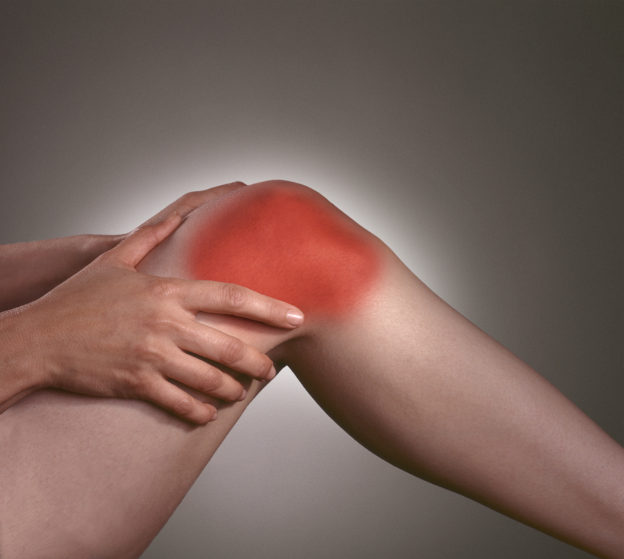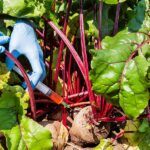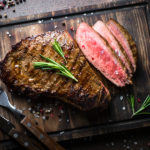By David Blyweiss, M.D., Advanced Natural Wellness
May 6, 2019
When Janet came to my office last month, she said her knees were bothering her.
They were stiff and creaky when she got out of bed in the morning. Sometimes they would give off a painful little pop when getting up from her chair. Going up and down stairs often produced a sharp pain in mid-step.
And it was getting worse.
Like many people her age, Janet is experiencing gradual onset knee osteoarthritis. And, in her case, it’s aggravated by a touch of runner’s knee (which, by the way, isn’t always caused by running).
The first thing we did after a normal exam of her knees was take a look at her current diet. And while she’s a pretty healthy eater, there was some room for improvement.
If you’re experiencing similar symptoms, that’s the same place you should start.
Specifically, sugar and other refined carbohydrates, salt, omega-6 fatty acids, red meats and dairy products all contribute to inflammation.
MD Exposes the Hidden Danger to Your Eyes

When your eyesight starts to fail, it's a real problem. Suddenly you can't go to the grocery store... you can't get to the doctor if you have an emergency... you can't meet your friends for dinner…
Your "regular" doctor doesn't have time to keep up with the latest research. And the same goes for eye doctors. They go to school to learn how to fit you for glasses and contacts, but have no way of preventing the damage and loss of eyesight that threatens your freedom and independence.
Let me show you something that explains a LOT about how your eyes work.
In my FREE Special Report, I'll show you a HUGE, untapped resource for your eyes that safely and naturally restores clear, effortless eyesight.
Click here to get started...
Sugars and refined carbs that cause spikes in blood sugar can trigger a release of inflammatory cytokines that aggravate your joints.
My recommendation: Avoid packaged foods and ALWAYS look for hidden sugars in the products you buy. Protein and energy bars, yogurt, whole grain breads and dried fruits probably contain a lot more sugar than you think. The same can be said for sports drinks, energy drinks, vitamin water and juices. Remember, 4 grams of sugar is about 1 teaspoonful, so that 29 grams in your yogurt is over 7 teaspoonsful! (And don’t forget about those white chocolate mocha and carmel mocchiato coffees that get you through the day!)
Higher sodium intake is associated with systemic inflammation and increased levels of inflammatory C-reactive protein (CRP). Elevated levels of this protein in osteoarthritis patients is associated with increased pain levels and decreased physical function.
My recommendation: According to the CDC, the top sources of sodium in the American diet are as follows. 1) Breads and rolls. 2) Pizza. 3) Sandwiches. 4) Processed meats. 5) Soups. 6) Tacos and burritos. 7) Chips, crackers and other salty snacks. 8) Chicken. 9) Cheese. 10) Omelets and eggs. This can give you a great starting point when it comes to cutting down sodium intake. And don’t forget to check labels on the other foods you buy.
Omega-6 fatty acids are inflammatory, yet they account for the majority of polyunsaturated fats in our food supply. Some inflammation-triggering foods high in omega-6 fatty acids include vegetable oils (corn, safflower, sunflower, soy, canola), salad dressings, fried foods and margarines.
My recommendation: Inflammatory omega-6 fatty acids fight for the same space in your body as ANTI-inflammatory omega-3s found in fish. Thus, slashing your omega-6 intake and increasing consumption of omega-3 rich seafood can restore your body to a natural anti-inflammatory state. Your best health benefits will come from smaller wild-caught fish like mackerel, salmon, herring, and sardines.
Red meats and dairy products are broken down in your body to produce a compound called trimethylamine- N-oxide (TMAO). This substance induces systemic inflammation that may contribute to arthritis pain and flare-ups as well as coronary artery disease.
My recommendation: Replace red meat with organic, pasture-raised poultry and wild-caught fish. You can also add more cold-pressed extra virgin olive oil, balsamic vinegar, red wine and grape seed oil to your diet to reduce your gut’s production of TMAO.
After reviewing Janet’s diet, she turned to me and said:
“Seriously, Doc. Is it REALLY that Easy?”
She was right to ask that question, because there were still two more steps left.
The next one was her exercise regimen.
Are You Suffering From...
- Love handles and a pot belly
- Romance that isn't what it used to
- Forgetfulness and inattention
- Low (or no) strength and endurance
- A sex drive that's shifted into neutral...or worse
If so...you may have Mature Male Burnout. Click here to discover more about this unique condition and what you can do about it.
For the time being running, jogging, squats, lunges and jumping jacks were off the table. They irritated her knees like crazy. But that didn’t mean she should stop exercising altogether. In fact, the RIGHT kind of exercise is exactly what her knees needed.
We found a free aquatic exercise program in her neighborhood that she signed up for. She also discovered a local yoga program and immediately joined up. Both of these types of activity are extremely easy on the knees. Plus, yoga introduces stretching movements that strengthen and support knee movement.
Last, but not least, we looked at some nutritional supplements that could help reduce inflammation, support healthy cartilage and ease some of her symptoms.
I recommended a minimum of 150 mg of green-lipped mussel daily support for joint tenderness, morning stiffness and pain. These unusual mussels contain furan fatty acids. They are similar to omega-3s, but have much more potent anti-inflammatory action.
I also suggested that she start taking…
- Bromelain (200 mg daily)
- Chicken cartilage extract (400 mg daily)
- Curcumin (500 to 1000 mg twice daily). Make sure it contains 95% curcuminoids with added bioperine.
The end of this story?
Today Janet is back to her normally active self. Stairs are no longer her enemy. Squats and lunges are back on her exercise routine.
It can be the same for you. All it takes is a few, minor adjustments to your lifestyle and the determination to make it happen.
SOURCES:
Buyken AE, et al. Carbohydrate nutrition and inflammatory disease mortality in older adults. Am J Clin Nutr. 2010 Sep;92(3):634-43.
Fogarty AW, et al. Is higher sodium intake associated with elevated systemic inflammation? A population-based study. Am J Clin Nutr. 2009 Jun;89(6):1901-4.
Jin X, et al. Circulating C reactive protein in osteoarthritis: a systematic review and meta-analysis. Ann Rheum Dis. 2015 Apr;74(4):703-10.
Top 10 Sources of Sodium. Centers for Disease Control and Prevention. Last reviewed: Sept 2017.
Baker KR, et al. Association of Plasma n-6 and n-3 polyunsaturated fatty acids with synovitis in the knee: the MOST Study. Osteoarthritis Cartilage. 2012 May; 20(5): 382–387.
Janeiro MH, et al. Implication of Trimethylamine N-Oxide (TMAO) in Disease: Potential Biomarker or New Therapeutic Target. Nutrients. 2018 Oct; 10(10): 1398.
Wakimoto T, et al. Furan fatty acid as an anti-inflammatory component from the green-lipped mussel Perna canaliculus. Proc Natl Acad Sci U S A. 2011 Oct 18;108(42):17533-7.
Coulson S, et al. Green-lipped mussel (Perna canaliculus) extract efficacy in knee osteoarthritis and improvement in gastrointestinal dysfunction: a pilot study. Inflammopharmacology. 2012 Apr;20(2):71-6.
Gibson SL, et al. The treatment of arthritis with a lipid extract of Perna canaliculus: a randomized trial. Comp Ther Med 1998;6:122–6.
Brien S, et al. Bromelain as a Treatment for Osteoarthritis: a Review of Clinical Studies. Evid Based Complement Alternat Med. 2004 Dec; 1(3): 251–257.
Lugo JP, et al. Efficacy and tolerability of an undenatured type II collagen supplement in modulating knee osteoarthritis symptoms: a multicenter randomized, double-blind, placebo-controlled study. Nutr J. 2016 Jan 29;15:14.
Appelboom T, et al. A new curcuma extract… in osteoarthritis: results from a belgian real-life experience. Open Rheumatol J. 2014 Oct 17;8:77-81.
Kuptniratsaikul V, et al. Efficacy and safety of Curcuma domestica extracts compared with ibuprofen in patients with knee osteoarthritis: a multicenter study. Clin Interv Aging. 2014 Mar 20;9:451-8.







